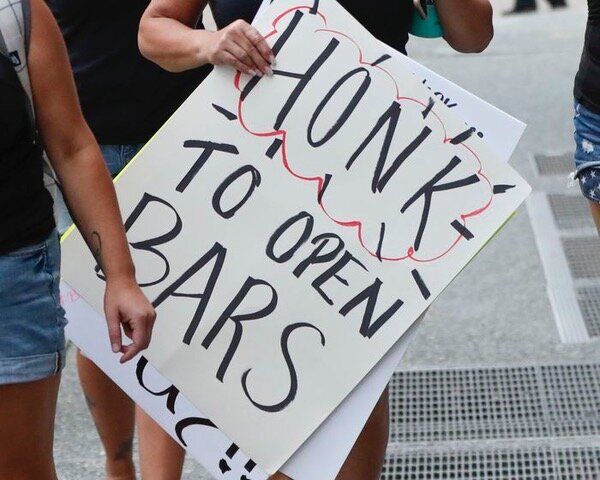How alcohol is spreading COVID
As published on AL.com
In an episode of the BBC series “Victoria,” set during the 1854 cholera outbreak in the working class neighborhood of Soho in London, John Snow, a local physician, recorded the number of cases by marking the unlucky houses with a pencil on a map.
It was, in effect, a 19th century version of contact tracing. He was looking for a pattern to find the source of the invisible epidemic devastating the West End of London. After much cross correlation, he discovered the source of the illness was a contaminated well on Broad Street the neighborhood shared.
Today, as cases of COVID-19 escalate at an alarming rate across the country and here in Alabama, our modern-day contaminated watering holes are the recently opened bars and restaurants.
At the beginning of the stay at home order, alcohol sales skyrocketed as people drank to ease their fears and stress while sheltering in place – and perhaps because their favorite restaurants and bars were closed. During the first month of the lockdown, online alcohol sales jumped 233% according to Nielsen. CNN reports alcohol sales have increased 27% over the past three months. Compared to the same period last year, Wine Business notes sales for spirits have risen 32%, wine 27%, while beer sales are up 17% This past Memorial Day Weekend, Americans spent $1 billion on beer.
As states reopen, people are understandably starved for social connection and desperate to go somewhere besides home to have a drink. But “You can’t drink and wear a mask,” a bar patron told the al.com reporter interviewing several Alabamians who had ventured back to their favorite watering holes.
People drink for a number of different reasons, but one reason is to loosen inhibitions. Sipping cocktails in the intimate, closed space of a bar allows people to let their guard down.
Drinking, as we know, affects our behavior, and often not in a good way. As Laura McKowen points out in her book, We Are the Luckiest, drinking is so normalized in our culture, it’s the only drug we have to explain why we’re not using. The word alcohol is derived from the Arabic word “al ghoul,” which translates into body eating spirit. On one end of the spectrum, a pale ale or a glass of wine relaxes us and makes us more agreeable. Sometimes though, you have a few drinks and the next thing you know, you’re saying, “Hold my beer and watch this” before you head to the hospital. To say alcohol impairs our judgment is an understatement.
Beyond the risky behavior, though, is something far more important as far as this virus is concerned. Alcohol damages the body, every organ in fact. It suppresses the immune system, and right now, we all need to be boosting our immune systems with what we ingest and how we behave. I quit drinking three years ago when I faced a health crisis. I needed to avoid the sugar, which is essentially what a glass of wine is. I also realized when my family dined out, I looked forward to the glass of Chardonnay more than the food. I had to reassess my habits in light of what was best for my health and those around me. The threat of a disease shook me to my senses.
Like the nobles in Edgar Allen Poe’s short story “Masque of the Red Death,” I live in a community where exceptionalism is the rule as the young gather in bars and families and friends gather at lake houses in high spirits with spirits even during a pandemic. In Poe’s story, Prince Prospero retreats with 1,000 other nobles to an abbey in the country to avoid being exposed to a plague called the “Red Death.” There they conduct business as usual and hold a masquerade ball. A mysterious guest dressed as the “Red Death” shows up infecting the guests who all die. Poe understood human nature and our ability to be deceived and seduced by our addictions to our own habits and illusions.
In real life, during the 14th century bubonic Plague in Italy, the well-off escaped to their country homes to entertain, as the wealthy thought they were immune to the fate of the less fortunate. As Birmingham attorney Frank McPhillips points out in his recent essay on the website “The Comeback Town,” here in Jefferson County, the rates of infection for the virus are actually higher in the so called “Over the Mountain” suburbs.
As McPhillips says, “An inescapable conclusion from this data is that the coronavirus makes no distinction between black and white America, or urban and suburban America but does distinguish between responsible vs. irresponsible America. Smart policy promoting responsible behavior saves lives.” He’s referencing specifically the mask wearing requirement the city put in place that the suburbs didn’t. Jefferson County has rectified the situation and made mask wearing a requirement.
During the cholera epidemic when John Snow discovered the real source of the disease wasn’t miasma, an invisible airborne infection, he convinced Queen Victoria to shut down the Broad Street well. Until the cholera outbreak was brought under control, that move was quite unpopular.
But ultimately that’s what government is for – to make often unpopular decisions for the community’s well- being. It seems unlikely our pandemic will be brought under control until state and federal government takes more decisive steps, even if they’re unpopular. That’s called leadership.
